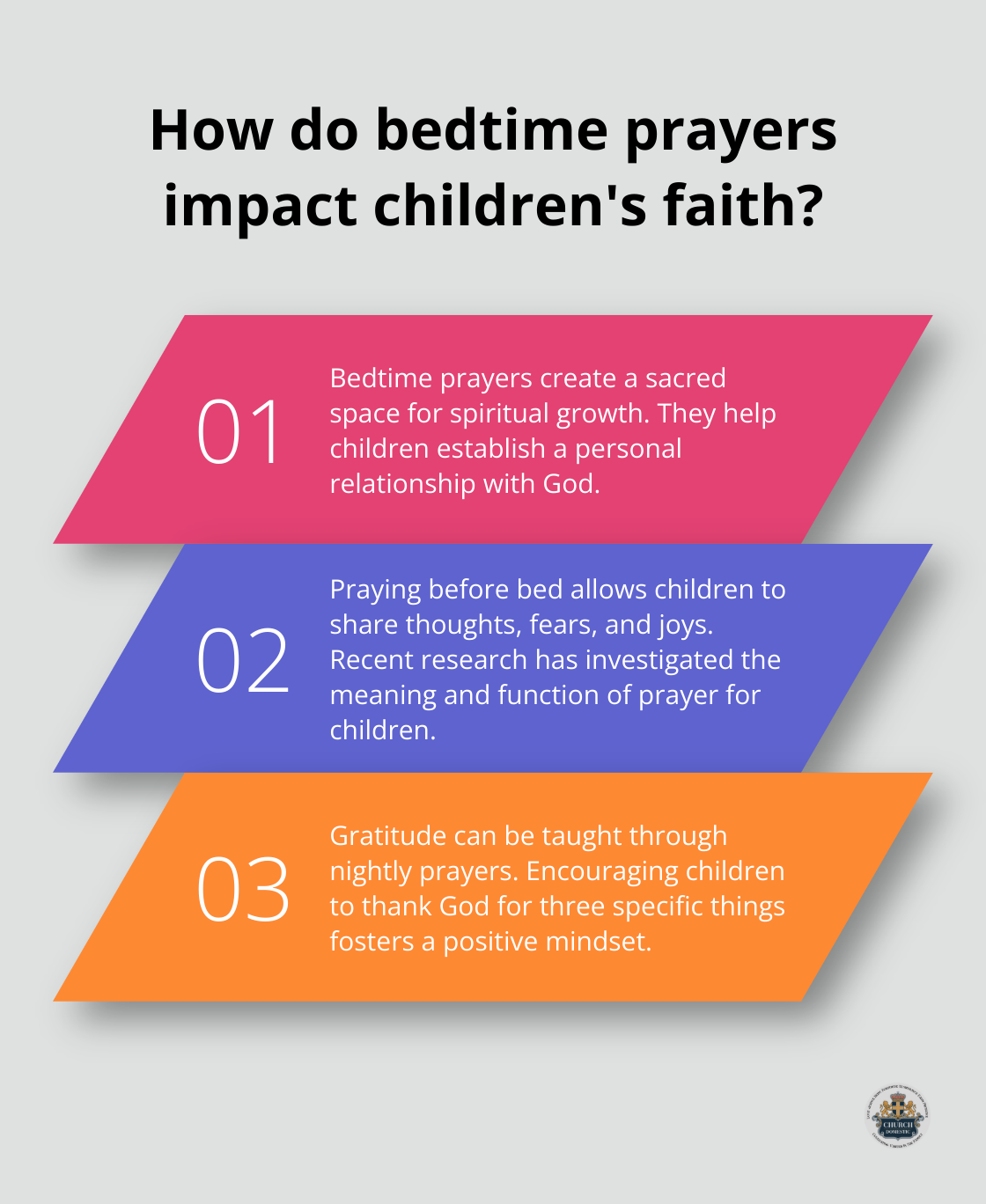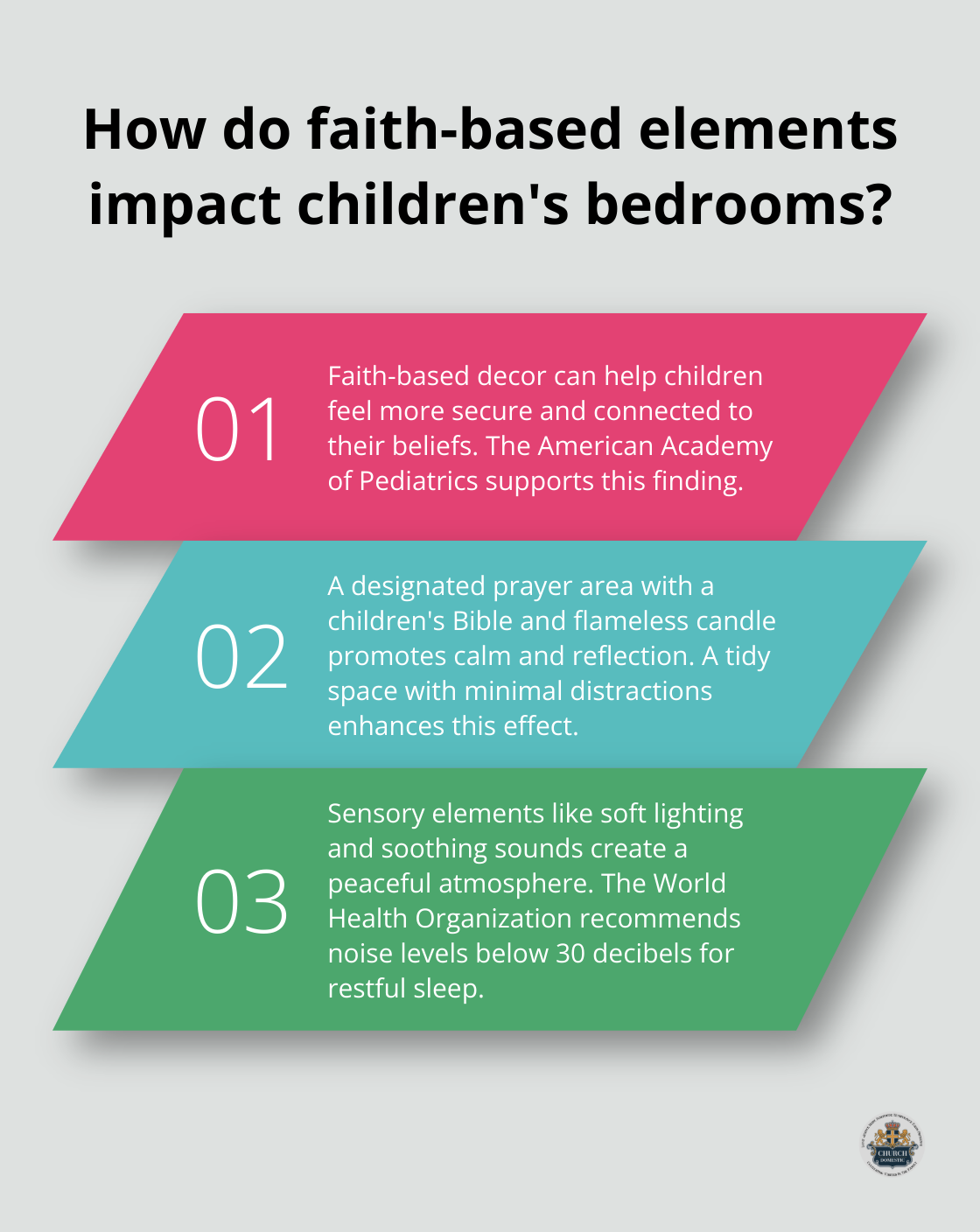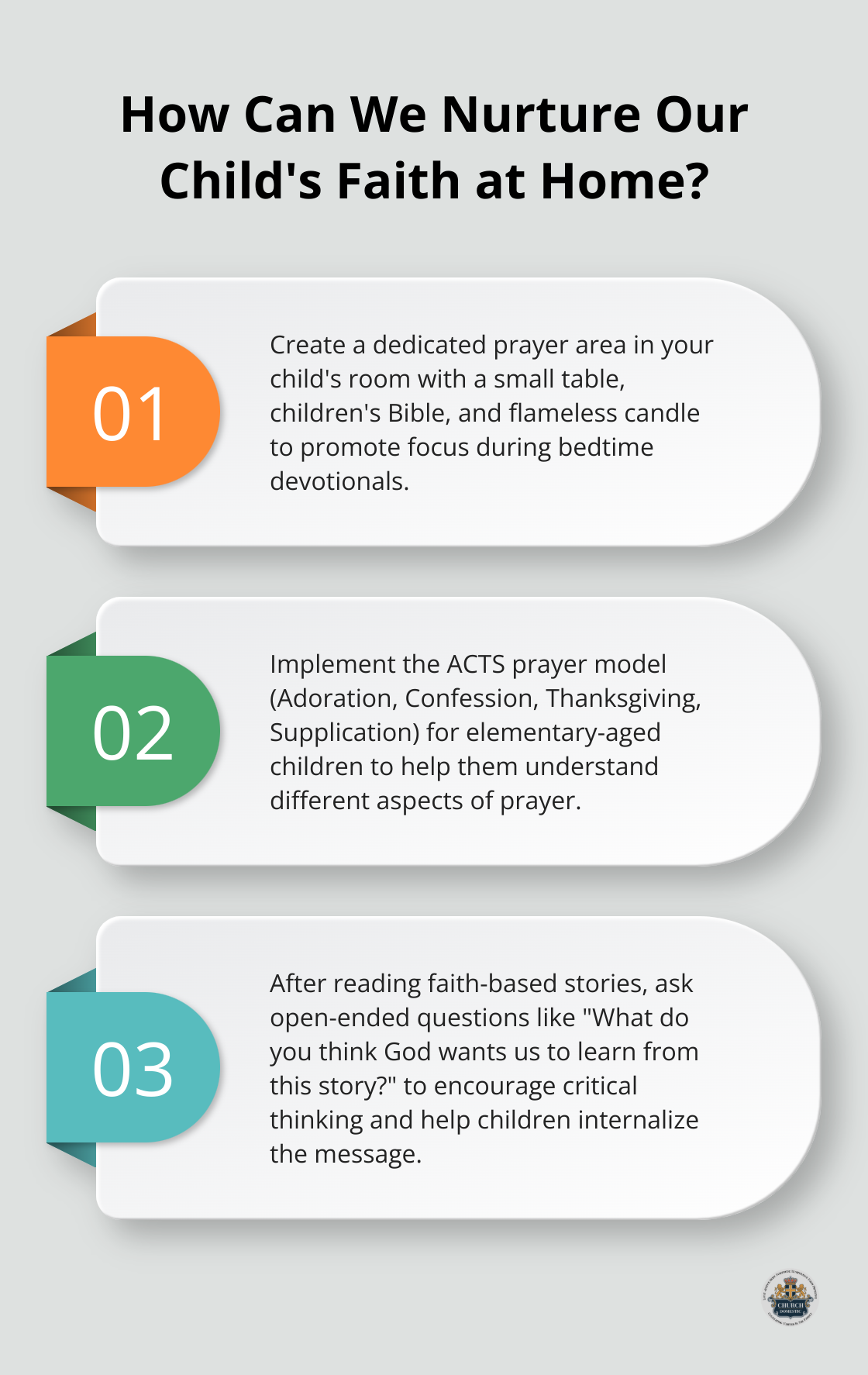Bedtime devotionals are a powerful way to nurture your child’s faith. At Church Domestic, we believe that nighttime rituals can create lasting spiritual connections for families.
These peaceful moments before sleep offer a unique opportunity to instill values, express gratitude, and strengthen your child’s relationship with God. In this post, we’ll explore effective nighttime practices that can help your child grow in faith.
How Bedtime Prayers Transform Your Child’s Faith
The Power of Nightly Prayers
Bedtime prayers are a powerful tool for nurturing your child’s faith. They create a sacred space for spiritual growth and connection with God. This simple practice can have a profound impact on a child’s spiritual journey.

Praying before bed helps children establish a personal relationship with God. It’s a time for them to share their thoughts, fears, and joys. Recent research has investigated the meaning and function of prayer for children.
To make bedtime prayers effective, create a calm environment. Dim the lights, sit comfortably, and eliminate distractions. This sets the stage for meaningful communication with God.
Teach Gratitude and Address Concerns
Bedtime prayers offer an excellent opportunity to teach children about gratitude. Encourage your child to thank God for three specific things each night. This practice not only fosters a positive mindset but also helps children recognize God’s presence in their daily lives.
It’s equally important to allow children to express their worries during prayer time. This teaches them to turn to God in times of need.
Age-Appropriate Prayer Ideas
For toddlers (ages 2-3), keep prayers simple and repetitive. A short rhyme like “Now I lay me down to sleep” can be effective. As children grow, encourage them to use their own words.
For elementary-aged children (ages 6-12), introduce the ACTS prayer model: Adoration, Confession, Thanksgiving, and Supplication. This structure helps children understand different aspects of prayer.
Teenagers benefit from more reflective prayer practices. Encourage them to keep a prayer journal or use prayer apps (like PrayerMate) to deepen their prayer life.
Consistency is the key to making bedtime prayers impactful. Try to make it a non-negotiable part of your nightly routine. Over time, this practice will become a cherished ritual that strengthens your child’s faith and your family bond.
As we move forward, let’s explore how storytelling can further enhance your child’s spiritual growth during bedtime routines.
Storytelling That Shapes Faith
Choosing the Right Stories
Storytelling is a powerful tool for nurturing your child’s faith. At bedtime, when children are relaxed and receptive, stories can leave lasting impressions on their spiritual development.

To use storytelling effectively, select age-appropriate books that align with your family’s beliefs. The Children’s Illustrated Bible presents over 100 well-loved stories from the Bible and works well for younger children, while The Chronicles of Narnia by C.S. Lewis can engage older kids with allegorical Christian themes.
Don’t limit yourself to published works. Personal stories of faith from your own life or family history can be incredibly impactful. Children often connect more deeply with real-life examples of faith in action.
Unpacking Spiritual Lessons
After reading, take time to discuss the story’s moral and spiritual themes. Ask open-ended questions like, “What do you think God wants us to learn from this story?” or “How can we apply this lesson to our lives?” This encourages critical thinking and helps children internalize the message.
For instance, after reading about David and Goliath, you might discuss courage and trusting God in difficult situations. Relate it to challenges your child might face, like standing up to a bully or tackling a tough school project.
Making Faith Relevant
Help your child connect stories to their daily experiences. If you’ve read about kindness, challenge them to perform a kind act the next day. If the story focused on forgiveness, discuss any situations where they might need to forgive someone.
Consider using a faith journal (a simple notebook will do) where your child can write or draw their reflections on the stories. This practice can deepen their understanding and provide a record of their spiritual growth over time.
Make storytelling a regular part of your bedtime routine. Over time, these stories will form a rich tapestry of faith that your child can draw upon throughout their life.
As we explore ways to nurture your child’s faith through storytelling, it’s important to consider the environment in which these stories are shared. Let’s move on to discuss how to create a peaceful and reflective atmosphere that enhances these spiritual moments.
Creating a Spiritual Sanctuary at Home
Declutter for Peace
A tidy space promotes calm and order. Remove distracting items and create a designated prayer or reflection area. This could be a small table with a children’s Bible and a flameless candle.
Studies have shown that people simply sleep better when their bedroom is optimized for temperature, noise and light levels, and comfort. Better sleep leads to a more focused mind, which supports spiritual growth.
Incorporate Faith-Based Decor
Add faith-based elements to your child’s room. This could include framed Bible verses, Christian-themed wall art, or a cross. Choose items that resonate with your child’s age and interests. For younger children, consider a Noah’s Ark themed night light or a guardian angel figurine.

The American Academy of Pediatrics found that visual reminders of faith can help children feel more secure and connected to their beliefs.
Create a Sensory Experience
Engage multiple senses to create a calming atmosphere. Use a diffuser with lavender essential oil, known for its relaxing properties. Soft lighting (like a salt lamp or dimmer switch) can signal that it’s time to wind down and reflect.
Introduce soothing background sounds. Christian lullabies or instrumental hymns can create a peaceful ambiance. Apps like Abide offer bedtime stories and meditations specifically designed for children.
Try to keep the volume low. The World Health Organization recommends a noise level below 30 decibels for restful sleep.
Establish a Cozy Prayer Spot
Designate a comfortable spot for prayer and reflection. This could be a soft rug with cushions, a rocking chair, or even a special corner of the bed. Make sure it’s a place where your child feels safe and comfortable.
Add tactile elements like a soft blanket or a stuffed animal. Physical comfort can help children feel more at ease when engaging in spiritual practices.
Involve Your Child in the Process
Let your child participate in creating their spiritual space. This ownership will make them more likely to engage with the environment. Ask them to choose a favorite Bible verse to display or pick out a special prayer journal.
A study published in the Journal of Positive Psychology found that children who have a sense of ownership over their spiritual practices are more likely to maintain their faith into adulthood.
This thoughtfully designed bedroom becomes more than just a place to sleep. It establishes a sanctuary where faith can flourish and spiritual connections can deepen. This environment sets the stage for meaningful nighttime rituals that will nurture your child’s faith for years to come.
Final Thoughts
Nighttime faith rituals nurture your child’s spiritual growth. Bedtime devotionals, faith-based storytelling, and a peaceful environment lay a strong foundation for your child’s lifelong journey with God. These practices deepen faith and provide comfort, security, and a sense of belonging.

Consistency matters in bedtime devotionals. Make these rituals a non-negotiable part of your nightly routine, but adapt as your child grows. Every family is unique, so your nighttime rituals should reflect your specific beliefs, values, and traditions.
We at Church Domestic believe these small, consistent actions at bedtime impact your child’s faith development. You equip your child with spiritual tools they’ll carry throughout their lives. Your commitment to creating space for faith to flourish in your home will bear fruit in unexpected ways.